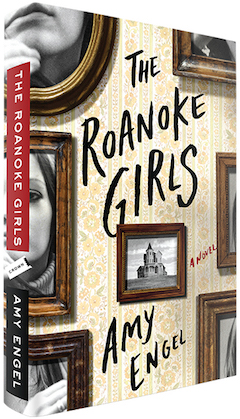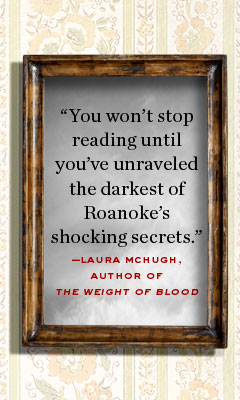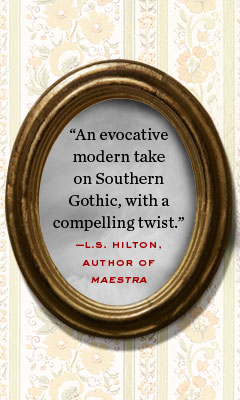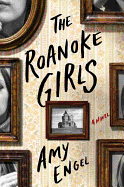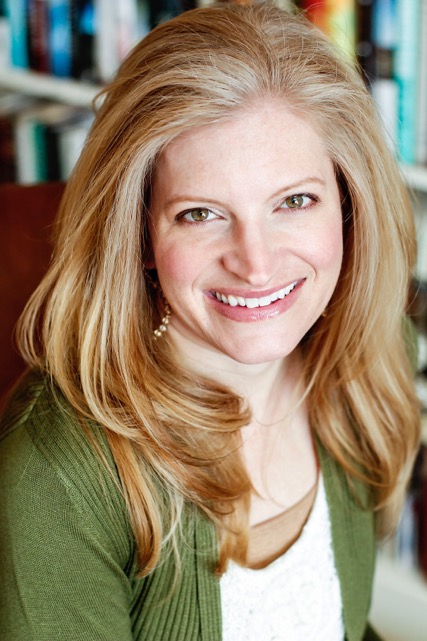The Roanoke Girls
by Amy Engel
Lane Roanoke is only 15 when her mother kills herself, leaving behind a cryptic note: "I tried to wait. I'm sorry." Lane never knew her father, and her mother never spoke of family, so the young girl is left alone in the world--or so she thinks. But the social worker assigned to her case informs her that she actually has kinfolk remaining, and they are eager to take her in. An excited and terrified Lane is bundled onto a bus, leaving behind New York City, the only home she's ever known, for a small town a few hours outside of Wichita, Kansas.
In Kansas, Lane finds relatives she never knew she had: a cousin, Allegra, six months her junior, vibrant and mercurial, with the same dark hair and willowy frame as Lane; grandparents Lillian and Yates, who welcome her into their home as one of their own; and a wall of pictures of the "Roanoke Girls," aunts and cousins and even Lane's own mother, preserved through time in aging photos hung in the big farmhouse. Allegra is quick to inform Lane about the dark side of the wall: all of the women are gone. "Roanoke girls never last long around here," she tells Lane. "In the end, we either run or we die."
This proves true for Lane, who stays only a short time at Roanoke before fleeing, leaving Allegra behind. Eleven years later, she's drawn back to the farm when her grandfather calls to tell her Allegra has gone missing. From this strange and twisted set-up, The Roanoke Girls shifts backward and forward in time, alternating between tales of Lane's teenage summer in Roanoke and her re-entry into her family's insular and disturbing world as an adult. As the story of the Roanokes unfolds, their many, many secrets slowly are revealed.
Amy Engel (author of the YA series The Book of Ivy) has built a dark, suspenseful story in her first novel for adults. The Roanoke Girls is, on one level, a mystery about a missing woman. In the present, Allegra has vanished without a trace, and many of the townspeople in the area are helping search for her. In the small town in which they live, however, the search for Allegra quickly turns into a search for Allegra's secrets, which devolves into an investigation into Allegra's whole life--and her entanglement in the lives of those around her.
On another level, The Roanoke Girls is the story of a family and its dark history, and the power that history holds over Lane. As a child, Lane was unloved by her mother; as a teenager, she found a unexpected family, only to learn that its love came at a great cost; as an adult, she lashes out at those who might love her, believing that "sometimes you have to hurt people just to prove you're alive." Against her better judgment, Lane comes crashing back to Roanoke, forced to come to terms with her family and her past.
As The Roanoke Girls unfolds, Lane's past and present become linked with Allegra's whereabouts, which in turn are tied to Roanoke secrets; Lane's memories may provide some clue to Allegra's disappearance. Engel uses these melding timelines to explore the long shadow of familial history, the power of secrets to bind people together and push them apart, and the many ways love can make people vulnerable.
Though Engel's novel is dark--especially the interludes that bring to life the stories of the rich and beautiful Roanoke girls and their miserable fates--it is not overly bleak. Surprisingly, given the missing woman, the dysfunctional family and the claustrophobic nature of the small town in which the Roanokes reside, Engel finds small moments of joy to highlight along the way: the simple pleasure of homemade ice cream on a large farmhouse porch; the sheer elation of reckless teenage summers; the indulgences of first loves and first sex.
At its heart, Roanoke Girls is a novel driven by its characters. But it is not so much about individuals standing alone as it is about relationships: with friends, families and lovers, and the occasional places where the three overlap. These are imperfect people in even more imperfect relationships, tinged with jealousy and manipulation and a lack of trust and more than a little bit of desire, and yet they are so real and so human that it is impossible not to understand them and root for them, even in all their awfulness.
This sense of humanity elevates The Roanoke Girls beyond mere mystery, mere suspense, mere story of dysfunction, morphing into a compelling story of psychological suspense that is relentless. --Kerry McHugh, blogger at Entomology of a Bookworm



